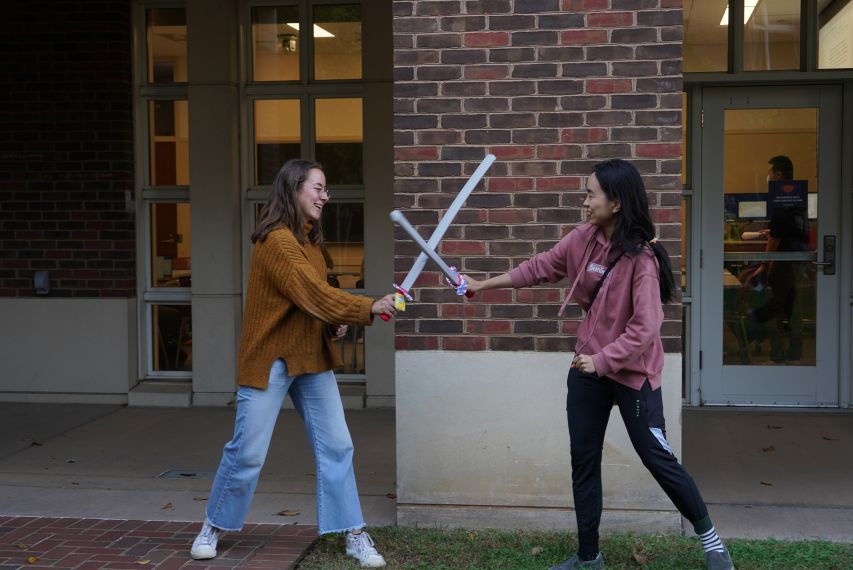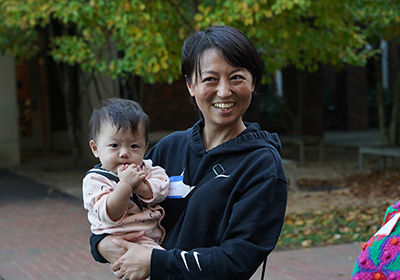Frisbees and balls flew across the Nau/Gibson courtyard amidst sounds of lively conversation and the drifting smell of Pearl Island’s Caribbean fare. For Global Week, Volunteers with International Students, Staff and Scholars (VISAS), was hosting their weekly Global Café with a special outdoor games-themed version.
“VISAS Café is the best part because I can make a lot of friends and talk with a lot of international students,” said Shinichi Aoyama, an ESL learner who has been participating in VISAS for two months. Ashley Jiang and Elahe Sadeghi, first year graduate students from China and Iran, respectively, agree with Aoyama.
“The games at [VISAS café] are my favorite part and talking about different topics and cultures are [also] my favorite part,” said Sadeghi and Jiang added that she loves the group discussions with different people from different backgrounds and the weekly snack.
VISAS Café emerged in 2015 as the newest in a family of programs hosted by Center for American English and Culture known as VISAS that matched domestic and international students and employees for English practice and cultural exchange. VISAS also includes language partners, ESL classroom assistants, partners who work with international employees at UVA, and volunteers who partner with new international TAs to help them adjust to teaching in a U.S. classroom. The Café is a weekly discussion group for practicing English in a group setting. Each week, they focus on a specific topic, such as shopping or school, and practice discussing that theme together.
Ada Zhang, a student intern who coordinates the Café each week, explains that in addition to English practice, this is also a chance for participants to feature their home cultures. For example, during the week they focused on school, Zhang was able to ask participants about applying to college and about extracurricular activities in their home countries.
Zhang, who started this fall, is the café’s fifth coordinator. She is excited that the café is back in-person. “Attendance was lower while we were virtual,” she explains, “now it’s much higher. Every week we see some of the same people and also a handful of newcomers.” And it’s no surprise that the café is popular, between food, games, and fun discussion. “It’s the highlight of my week! I really enjoy the creativity of coming up with new themes and of working with our small group of volunteers as a team,” Zhang exclaimed.
In addition to the normal VISAS crowd, Global Week’s VISAS Global Café also brought in volunteers from the Center for American English Language and Culture’s newest program: MOVE, or the Multilingual Outreach Volunteer Effort. MOVE emerged during the pandemic out of a desire to make urgent and rapidly changing public health information available to Charlottesville’s multilingual communities. Harnessing the language skills of its volunteers, MOVE translates essential documents about things such as vaccine clinics and information for people experiencing homelessness. This was MOVE volunteers’ first chance to meet in person.
Aleena Haidari and Lima Mohammad Asim both started volunteering for MOVE in Spring 2020. Haidari described how she grew up in Charlottesville and as a result knew that there were large populations of people here who needed resources in other languages. Similarly, Mohammad Asim explained that her aunt and uncle, who came here from Afghanistan, struggled to access resources and this motivated her to harness her language knowledge. Both added that it was important to them to use the language skills they had towards something greater than themselves.
“I like how this [program] is thinking about other people as well. Students who speak other languages aren’t always able to share their skills to help other people, but this matches people up so they can actually be useful,” Mohammad Asim said. “And there’s a mutual benefit to both sides,” added Haidari, describing how her translation work allows her to use language skills that otherwise might not get very much practice.
Both students were excited to join the event and to get the opportunity to meet other MOVE volunteers for the first time, as the format of MOVE, developed in pandemic conditions, allows for individual work, but not much connection with others.
Watching MOVE volunteers and VISAS Café regulars play sword fight and kick a soccer ball, it was easy to see the benefits of simply being together (safely) as a multilingual, international community.
Written by Emily Mellen. Photos by VISAS volunteer Celine Liu.





